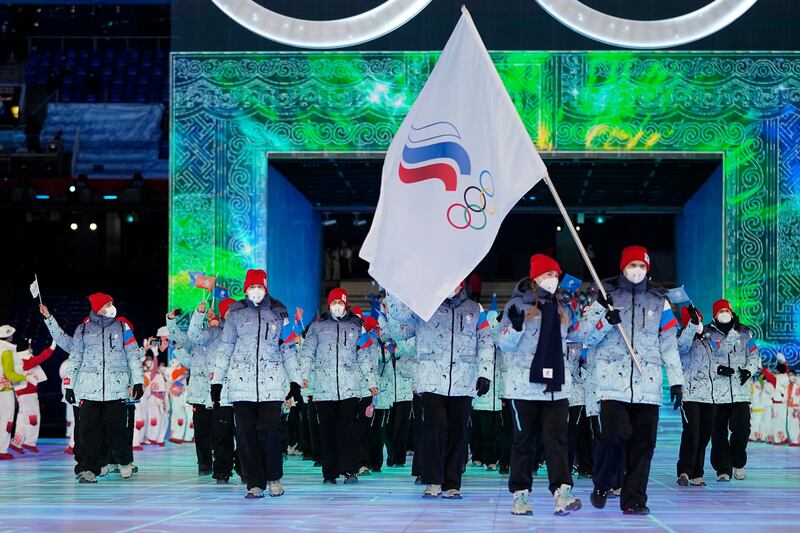The British government is pushing worldwide Olympic sponsors to pressure the International Olympic Committee over a proposal expected to permit Russians and Belarusians to compete as neutral athletes in the 2024 Summer Games in Paris.
The IOC responded by telling governments to stay out of sports and continuing to defend what would be a reversal of its previous call to bar Russian and Belarusian athletes after Russia invaded Ukraine just over a year ago with help from neighboring Belarus.
“It is not up to governments to decide which athletes can participate in which international competitions. This would be the end of world sport as we know it today,” the IOC posted in the latest update to a long list of questions and answers about the proposal.
Olympic sponsors also “are not involved in this decision-making process,” the IOC said.
“What is under discussion in the Olympic Movement right now is nothing different from what is already happening in a number of international sports,” the IOC said, citing a Texas tennis tournament won by a Ukrainian in a final match against a Russian.
The United Kingdom’s new secretary of state for culture, media and sport, Lucy Frazer, has joined Ukrainian President Volodymyr Zelenskyy in reaching out to the 14 international companies that are a major source of revenue for the IOC.
In what The Guardian newspaper called “a highly unusual move,” she requested assistance from companies estimated to have paid as much as $300 million each for a four-year sponsorship to be part of The Olympic Partner, or TOP, program.
“As an Olympic partner, I would welcome your views on this matter and ask you to join us in pressing the IOC to address the concerns raised in our statement,” she said in a letter sent Friday to U.K. executives of the companies, including Coca-Cola, Intel, Samsung and VISA.
Frazer reiterated concerns about the IOC proposal raised last month in a statement about Russian and Belarusian athlete participation that was signed by representatives of 35 countries, including the United States.
“We know sport and politics in Russia and Belarus are heavily intertwined, and we are determined that the regimes in Russia and Belarus must not be allowed to use sport for their propaganda purposes,” she wrote, according to The Guardian.
“As long as our concerns and the substantial lack of clarity and concrete detail on a workable ‘neutrality’ model are not addressed, we do not agree that Russian and Belarusian athletes should be allowed back into competition,” she continued.
Pointing out that no final decision has been made, Frazer said in her letter that the IOC has been “strongly urged” to respond to the issues being raised “and reconsider its proposal accordingly.”
Last month, Zelenskyy said during an address to the Ukrainian people that he had sent letters opposing the IOC’s proposal “to the companies that support the International Olympic Committee the most.”
The Ukrainian president described them as “large international companies that are definitely interested in ensuring that their reputation and support are not used for war propaganda.”
It’s not clear how — or even if — the Olympic sponsors will respond, said Mark Conrad, director of the sports program at Fordham University’s Gabelli School of Business in New York City.
“They’re in a very tough spot,” Conrad said, after spending so much money to be able to sell themselves as part of the Olympics. And, the professor said, there are likely plenty of other companies willing to take their place.
“I don’t see these sponsors pressuring the IOC yet,” Conrad said, even though companies have been persuaded to get involved in largely domestic issues in the past, such as Atlanta-based Coca-Cola’s stand against voting restrictions in Georgia in 2021.
“But here, as long as the sponsors need the IOC more than the IOC needs them, the leverage could be in favor of the IOC,” he said, especially with the interest next summer’s Paris Games is expected to generate.
“So do they really want to get into a dispute, an open dispute, with the IOC? I really do wonder about that,” Conrad said. “I’m just not terribly optimistic that they’re going to make that kind of statement. ... In fact, I think they’re going to be keeping pretty quiet now.”
The IOC rolled out a proposal in January to let Russians and Belarusians back into international competition as neutral athletes, without flags, anthems or other identifiers of their countries, as long as they have not actively supported Russia’s invasion of Ukraine.
It’s been widely criticized since by both Ukraine and its allies as well as by Russia, where officials have demanded that the IOC not treat their athletes any differently because of the war, now entering a second year.
Ukrainian officials have gone so far as to threaten a boycott of the Paris Olympics if Russians and Belarusians are able to participate. The mayor of Paris has said it would be “indecent” for them to participate as long as “the bombs continue to rain down on Ukraine.”
The IOC has said it is “premature” to assume there will be a place for Russians and Belarusians in the next Olympics and that the current discussions underway with other sports entities is about their competing in international events this summer in Asia.


